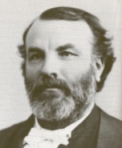| 1898 Biography of H. C. St.Pierre |

Mes racines / My rootsHenri Césaire Saint-PierreCe document a été transcrit par Jacques Beaulieu, arrière-petit-fils de son sujet. / This document was translated by Jacques Beaulieu, great-grand-son of Henri Césaire Saint-Pierre.ST. PIERRE, Henri Cesaire, Q.C., is the s. of the late Joseph St.Pierre, a patriot of '37, by his wife, Domitilde Denis. B. at Ste. Madeleine, P.Q., Sept. 13, 1844, he was ed. at the Montreal Coll., and, subsequently, studied law with City Atty. Agnew, of Kingston, Ont. The Am. civil war was then at its height, and young St. P., yielding to a desire for a mil. life, joined the Northern forces. He served in the 76th N. Y. Volunteers, but being wounded in Va., in the autumn of 1863, was captured by the enemy, and remained a prisoner of war in the South until the close of the war. Resuming his law studies in the office of the late Sir. Geo. Cartier, Montreal, he was called to the bar, 1870, has since practised his profession in Montreal, and is now regarded as «probably the leading criminal lawyer of the Province.» (Toronto Mail). It has been stated that he has defended more than 80 persons accused of capital offences, and that he has been successful in all but 3 or 4. None of those he defended, excepting Shortis, the Beauharnois murderer, were condemned for execution. In 1887 he defended Caza for murder, and, in 1897, he was chief counsel for the Hon. J. I. Tarte in the Grenier libel case. He was created a Q.C., by the Earl of Derby, 1889, and is now a mem. of the firm St. Pierre, Pellisier & Wilson. In politics, he is a Lib., and unsuccessfully contested Jacques Cartier in that interest, for the Que. Assembly, g. e. 1878. Since then he has devoted himself exclusively to the calls of his profession, and has persistently declined all invitations looking to political or other honours. Mr St. P. is gifted with fine powers of eloquence, and on occasions when he has appeared in public, has won unstinted praise from all classes of the Can. population, for the liberality of sentiment and broad-minded patriotism. On this account, his speech at the unveiling of the Chenier monument, Montreal, Dec., 1895, attracted considerable attention. Addressing more particularly his French-Can. countrymen, on that occasion, he said he would like an end put to the exclusiveness, for why should not a French-Can. be just as much at home in Toronto than in Montreal? Can. was a great deal more to them than the Province of Quebec. He would say to all: «Be English, be Scotch, be French, be Irish, if you will, but above and before all, let us be Canadians.» In religion, a R. C., he m. 1874, Adeline Albina, dau. of the late Adolphe Lesieur, merchant, Terrebonne. - 144 Berri St., Montreal.The Canadian men and women of the time: a handbook of Canadian biography Morgan, Henry J. (1842-1913) Toronto: W. Briggs 1898 pages 902-903 |
Jacques Beaulieu
beajac@videotron
Révisé le 22 juillet 2019
Ce site a été visité 49716948 fois
depuis le 9 mai 2004